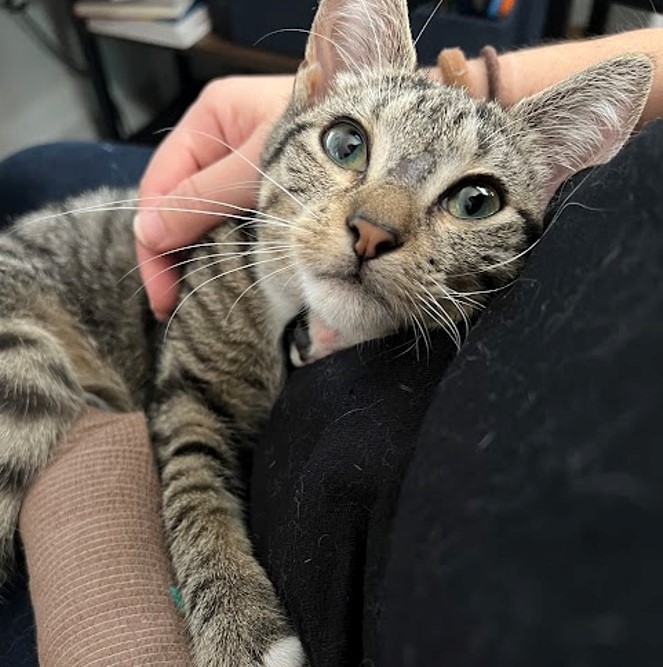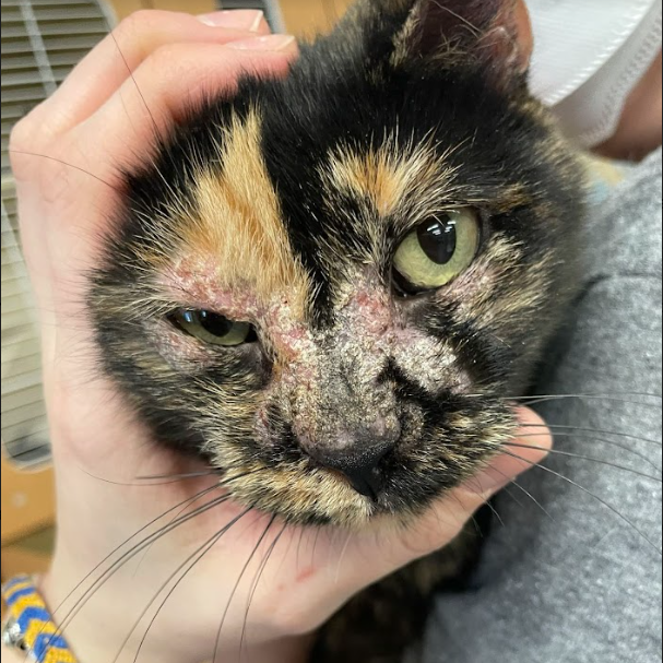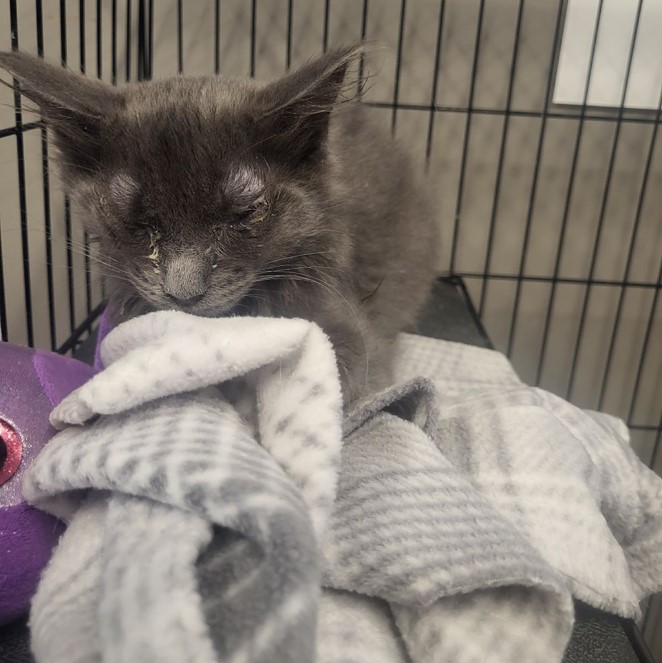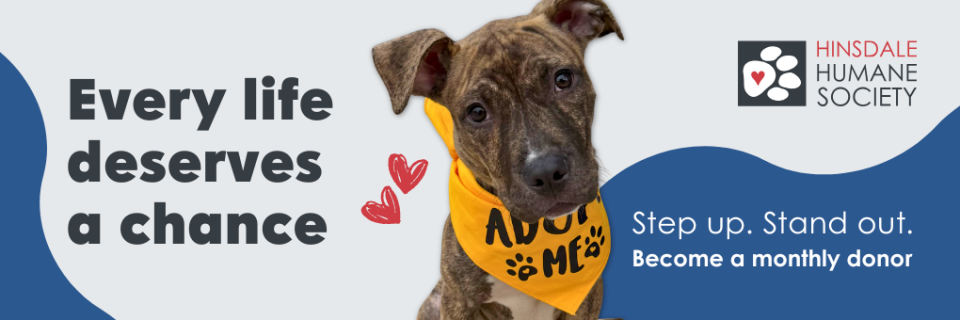Feline Medical Support
Kitten season is fast approaching, and with that comes a plethora of contagious diseases. What is Kitten season? Kitten season is the period between spring and fall when cats typically mate and give birth to litters of kittens. Most people don't know, but cats can start having litters at only 6 months old, and can give birth to multiple litters per season. Usually this happens when the weather warms up, but due to a mild winter this year, kitten season is already upon us. With so many kittens being born, shelters, including us, are overwhelmed by the number of bottle baby kittens and pregnant or nursing mama cats that come through the doors. With this influx of animals, we have been taking in more and more kittens who need medical help.
In order to provide a safe and healthy environment for all of our animals at Hinsdale Humane Society, we are asking for donations to cover the cost of medical treatment for kittens diagnosed with panleukopenia, URIs (upper respiratory infections) and ringworm, all common cat diseases in a shelter environment. We are also in need of donations for specialized cleaning supplies, equipment and materials to keep everyone separated and keep our healthy cats and kittens safe.
 Some of you may remember sweet Apple, an adorable 3-month old kitten, who came to us from our partner Chicago Animal Care and Control with a broken leg that needed treatment. Unfortunately, the day after we accepted her into our care, she also developed severe lethargy, vomiting, diarrhea, and refused to eat or drink. She tested positive for panleukopenia. Feline panleukopenia (FP) is a highly contagious viral disease of cats caused by the feline parvovirus and kittens are most severely affected by the virus.
Some of you may remember sweet Apple, an adorable 3-month old kitten, who came to us from our partner Chicago Animal Care and Control with a broken leg that needed treatment. Unfortunately, the day after we accepted her into our care, she also developed severe lethargy, vomiting, diarrhea, and refused to eat or drink. She tested positive for panleukopenia. Feline panleukopenia (FP) is a highly contagious viral disease of cats caused by the feline parvovirus and kittens are most severely affected by the virus.
The HHS medical and animal care teams sprang into action to provide Apple with around-the-clock supportive care including fluids, appetite stimulants, anti-nausea medications, and enticing her to eat with love, petting, and lots of yummy options. Apple spent two weeks in our isolation ward until she was no longer contagious, and then spent some time in a foster home until she found her forever home.
In 2022, our medical team diagnosed and treated 15 cases of panleukopenia. Despite a reported 50% mortality rate for panleukopenia, we saw cure rates of over 80% of our affected kitties, thanks to our intensive supportive care protocols in the shelter.
 We received a transport with a mama cat and her kitten (Star/Moon), a pair of teenage kittens (Wilbur/Meow) and a second pair of kittens (Twinkle/Miss Mary) that all had obvious ringworm lesions on their head, ears, and paws. Ringworm is a fungal infection of the skin, hair, and nails, and is highly contagious in kittens and cats.
We received a transport with a mama cat and her kitten (Star/Moon), a pair of teenage kittens (Wilbur/Meow) and a second pair of kittens (Twinkle/Miss Mary) that all had obvious ringworm lesions on their head, ears, and paws. Ringworm is a fungal infection of the skin, hair, and nails, and is highly contagious in kittens and cats.
We immediately moved them into our cat isolation room to prevent spread of the fungal spores to our other cats in our intake area and initiated treatment with antifungal sprays and oral antifungal medications. They all received a 6-week course of treatment before being cleared by laboratory testing and placed back up for adoption.
In 2022, we successfully treated over 30 ringworm cases in cats and kittens. Nearly all of these felines came in with symptoms already present, yet spread did not occur in our adoptable population. That is a testament to our cleaning and disinfection protocols, as well as our dedicated staff and volunteers. Treatment lasts 6 weeks at the shelter, with costs of feeding and caring for the cats quickly adding up during that time. We spent $1000 on ringworm medications in 2022, and will likely spend a similar amount this year.
We spend approximately $1500 each month on shelter disinfectants to prevent the spread of these diseases from cat-to-cat. These are specifically designed to kill ringworm and other viruses and bacteria that can make our cats sick.
 Our most recent case of severe upper respiratory infection involved 3 kittens named Coco Chanel, Betsey Johnson, and Donatella Versace. Our fashion designer kittens were not feeling so glamorous and had severely infected eyes, congestion and difficulty breathing. Viruses that cause upper respiratory infections (URI) in kittens and cats are incredibly common and can cause severe symptoms that may even result in death if care is not initiated quickly
Our most recent case of severe upper respiratory infection involved 3 kittens named Coco Chanel, Betsey Johnson, and Donatella Versace. Our fashion designer kittens were not feeling so glamorous and had severely infected eyes, congestion and difficulty breathing. Viruses that cause upper respiratory infections (URI) in kittens and cats are incredibly common and can cause severe symptoms that may even result in death if care is not initiated quickly
Our animal care team, directed by our veterinarian, began antibiotics, fluids, appetite support, and antiviral eye drops. Within a few days they were feeling much better and after a week of intensive care, they were able to be placed up for adoption.
Won’t you help us be successful in saving our feline friends in 2023? We need your help to keep our kitties happy and healthy. Every dollar helps, so please consider donating to our kitten season medical fundraiser.
Comments (1)
Leave a Comment
Share your thoughts about this post with us.

Fri, May 12, 2023, 10:30 AM